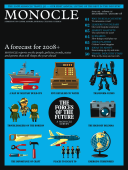
Issue 9
A forecast for 2008+: Monocle reports on the people, policies, trends, states and genres that will shape the year ahead.
In This Issue
Oops! No content was found.
Looks like we no longer have content for the page you're on. Perhaps try a search?
Return Home

